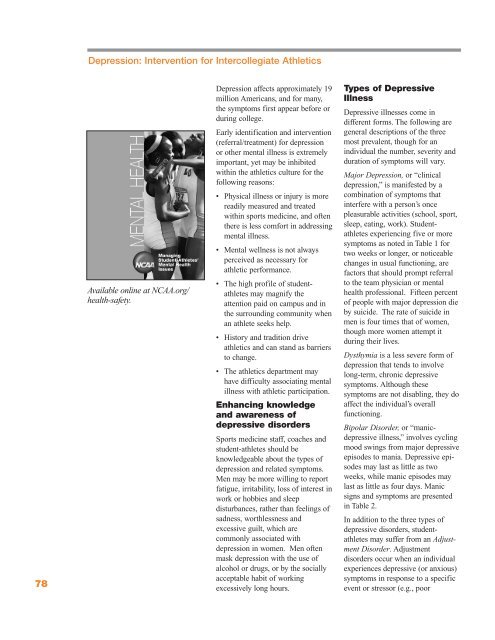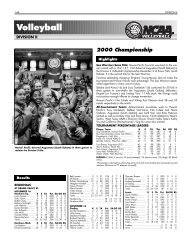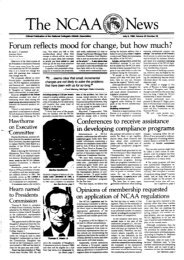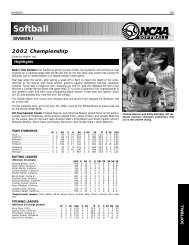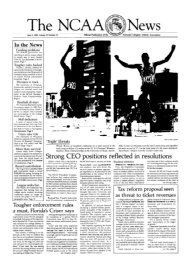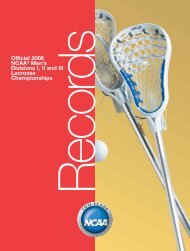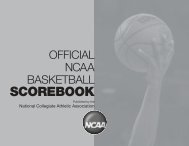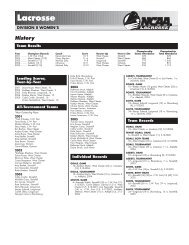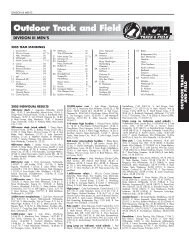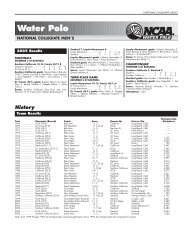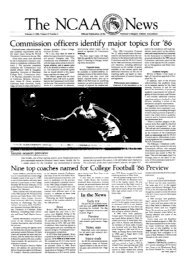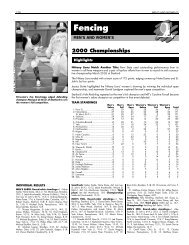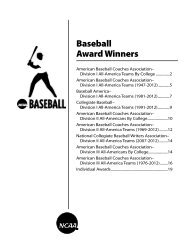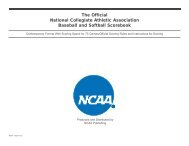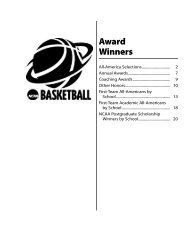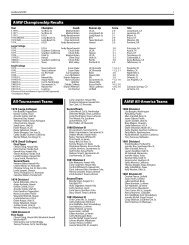Sports Medicine Handbook - NCAA
Sports Medicine Handbook - NCAA
Sports Medicine Handbook - NCAA
You also want an ePaper? Increase the reach of your titles
YUMPU automatically turns print PDFs into web optimized ePapers that Google loves.
78<br />
Depression: Intervention for Intercollegiate Athletics<br />
Available online at <strong>NCAA</strong>.org/<br />
health-safety.<br />
Depression affects approximately 19<br />
million Americans, and for many,<br />
the symptoms first appear before or<br />
during college.<br />
Early identification and intervention<br />
(referral/treatment) for depression<br />
or other mental illness is extremely<br />
important, yet may be inhibited<br />
within the athletics culture for the<br />
following reasons:<br />
• Physical illness or injury is more<br />
readily measured and treated<br />
within sports medicine, and often<br />
there is less comfort in addressing<br />
mental illness.<br />
• Mental wellness is not always<br />
perceived as necessary for<br />
athletic performance.<br />
• The high profile of studentathletes<br />
may magnify the<br />
attention paid on campus and in<br />
the surrounding community when<br />
an athlete seeks help.<br />
• History and tradition drive<br />
athletics and can stand as barriers<br />
to change.<br />
• The athletics department may<br />
have difficulty associating mental<br />
illness with athletic participation.<br />
Enhancing knowledge<br />
and awareness of<br />
depressive disorders<br />
<strong>Sports</strong> medicine staff, coaches and<br />
student-athletes should be<br />
knowledgeable about the types of<br />
depression and related symptoms.<br />
Men may be more willing to report<br />
fatigue, irritability, loss of interest in<br />
work or hobbies and sleep<br />
disturbances, rather than feelings of<br />
sadness, worthlessness and<br />
excessive guilt, which are<br />
commonly associated with<br />
depression in women. Men often<br />
mask depression with the use of<br />
alcohol or drugs, or by the socially<br />
acceptable habit of working<br />
excessively long hours.<br />
Types of Depressive<br />
Illness<br />
Depressive illnesses come in<br />
different forms. The following are<br />
general descriptions of the three<br />
most prevalent, though for an<br />
individual the number, severity and<br />
duration of symptoms will vary.<br />
Major Depression, or “clinical<br />
depression,” is manifested by a<br />
combination of symptoms that<br />
interfere with a person’s once<br />
pleasurable activities (school, sport,<br />
sleep, eating, work). Studentathletes<br />
experiencing five or more<br />
symptoms as noted in Table 1 for<br />
two weeks or longer, or noticeable<br />
changes in usual functioning, are<br />
factors that should prompt referral<br />
to the team physician or mental<br />
health professional. Fifteen percent<br />
of people with major depression die<br />
by suicide. The rate of suicide in<br />
men is four times that of women,<br />
though more women attempt it<br />
during their lives.<br />
Dysthymia is a less severe form of<br />
depression that tends to involve<br />
long-term, chronic depressive<br />
symptoms. Although these<br />
symptoms are not disabling, they do<br />
affect the individual’s overall<br />
functioning.<br />
Bipolar Disorder, or “manicdepressive<br />
illness,” involves cycling<br />
mood swings from major depressive<br />
ep i sodes to mania. Depressive ep isodes<br />
may last as little as two<br />
weeks, while manic episodes may<br />
last as little as four days. Manic<br />
signs and symptoms are presented<br />
in Table 2.<br />
In addition to the three types of<br />
depressive disorders, studentathletes<br />
may suffer from an Ad justment<br />
Disorder. Adjustment<br />
disorders occur when an individual<br />
experiences depressive (or anxious)<br />
symp toms in response to a specific<br />
event or stressor (e.g., poor


